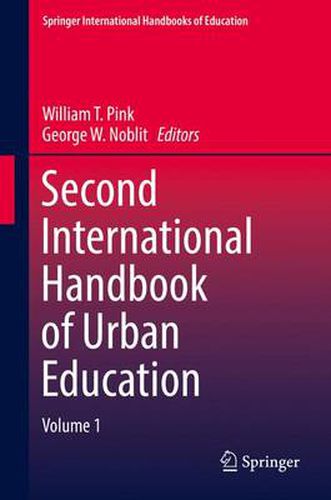Readings Newsletter
Become a Readings Member to make your shopping experience even easier.
Sign in or sign up for free!
You’re not far away from qualifying for FREE standard shipping within Australia
You’ve qualified for FREE standard shipping within Australia
The cart is loading…






This second handbook offers all new content in which readers will find a thoughtful and measured interrogation of significant contemporary thinking and practice in urban education. Each chapter reflects contemporary cutting-edge issues in urban education as defined by their local context. One important theme that runs throughout this handbook is how urban is defined, and under what conditions the marginalized are served by the schools they attend.
Schooling continues to hold a special place both as a means to achieve social mobility and as a mechanism for supporting the economy of nations. This second handbook focuses on factors such as social stratification, segmentation, segregation, racialization, urbanization, class formation and maintenance, and patriarchy. The central concern is to explore how equity plays out for those traditionally marginalized in urban schools in different locations around the globe. Researchers will find an analysis framework that will make the current practice and outcomes of urban education, and their alternatives, more transparent, and in turn this will lead to solutions that can help improve the life-options for students historically underserved by urban schools.
$9.00 standard shipping within Australia
FREE standard shipping within Australia for orders over $100.00
Express & International shipping calculated at checkout
This second handbook offers all new content in which readers will find a thoughtful and measured interrogation of significant contemporary thinking and practice in urban education. Each chapter reflects contemporary cutting-edge issues in urban education as defined by their local context. One important theme that runs throughout this handbook is how urban is defined, and under what conditions the marginalized are served by the schools they attend.
Schooling continues to hold a special place both as a means to achieve social mobility and as a mechanism for supporting the economy of nations. This second handbook focuses on factors such as social stratification, segmentation, segregation, racialization, urbanization, class formation and maintenance, and patriarchy. The central concern is to explore how equity plays out for those traditionally marginalized in urban schools in different locations around the globe. Researchers will find an analysis framework that will make the current practice and outcomes of urban education, and their alternatives, more transparent, and in turn this will lead to solutions that can help improve the life-options for students historically underserved by urban schools.